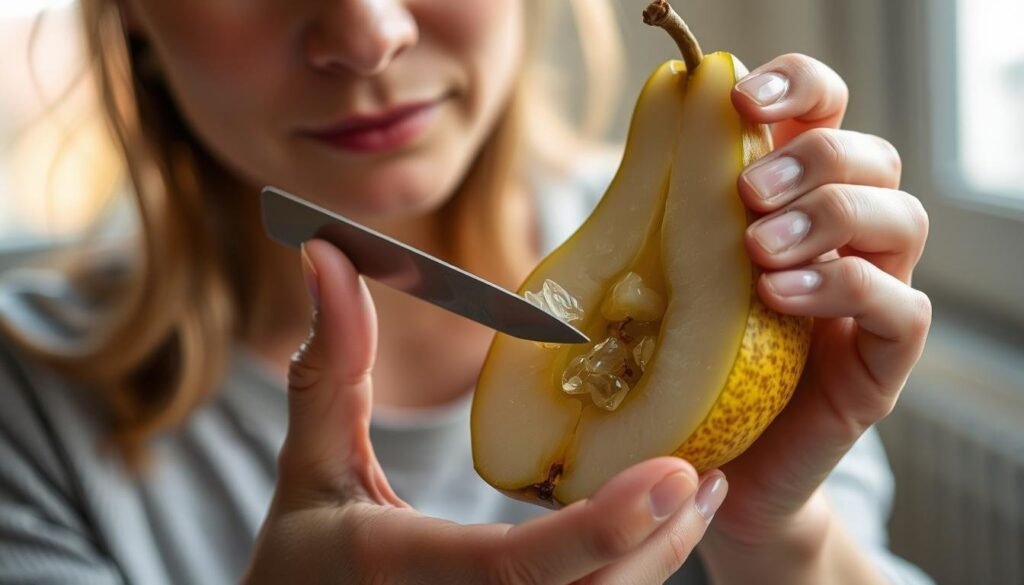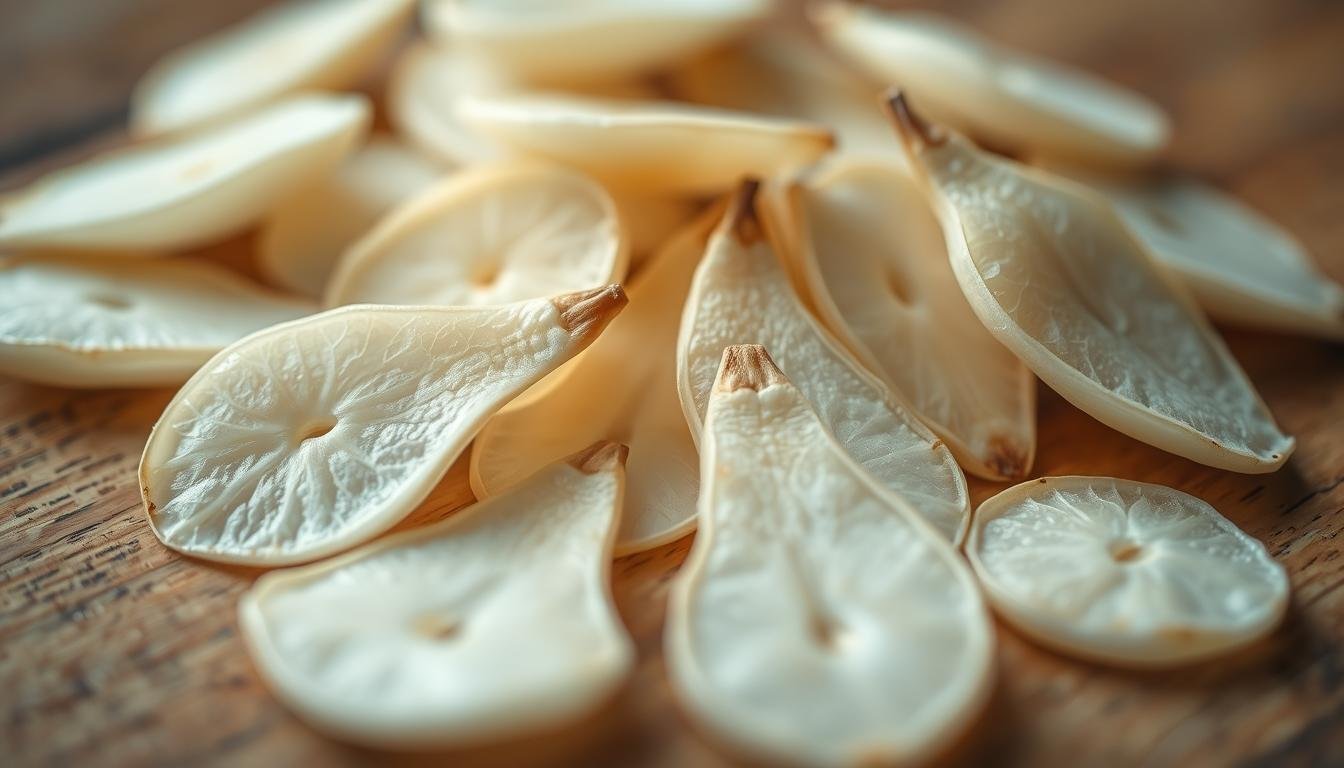Last updated on August 21st, 2025 at 02:45 pm
Eating Pear Seeds: If you’re like many people, you enjoy snacking on pears. But have you ever stopped to think about the seeds inside? While it may seem harmless to eat them, there are some important considerations to keep in mind.
Eating pear seeds has sparked interest and debate. Some people may be concerned about potential health risks, while others are curious about the nutritional benefits. As you explore this topic further, you’ll discover that there are valid points on both sides.
This article will delve into the details, providing you with a comprehensive understanding of what it means to consume pear seeds. By the end, you’ll be better equipped to make informed decisions about your snacking habits.
Contents
- 1 What’s Inside a Pear Seed?
- 2 Can You Eat the Seeds of a Pear?
- 3 The Science Behind Pear Seeds
- 4 Potential Health Effects of Consuming Pear Seeds
- 5 Pear Seeds vs. Other Fruit Seeds
- 6 How People Consume Pear Seeds
- 7 Conclusion: Eating Pear Seeds
- 8 FAQ
- 8.1 Are pear seeds safe to eat?
- 8.2 What is amygdalin, and is it toxic?
- 8.3 Can eating pear seeds cause allergic reactions?
- 8.4 How do pear seeds compare to other fruit seeds in terms of toxicity?
- 8.5 Can roasting or cooking pear seeds reduce their toxicity?
- 8.6 Are there any potential health benefits to consuming pear seeds?
- 8.7 How can I incorporate pear seeds into my diet safely?
What’s Inside a Pear Seed?
Pear seeds are more than just reproductive parts. They are filled with nutrients and bioactive compounds. When you eat a pear, you might be curious about its seeds. Pear seeds have proteins, healthy fats, and vitamins and minerals.
| Nutrient | Amount per 100g | % Daily Value |
|---|---|---|
| Protein | 10g | 20% |
| Healthy Fats | 15g | 23% |
| Fiber | 5g | 20% |
Pear seeds are a great addition to your diet. They are full of antioxidants and bioactive compounds. These can help improve your health.
Knowing what’s in pear seeds helps us see their health benefits. As we learn more, you’ll understand how these nutrients support your health.
Can You Eat the Seeds of a Pear?
Thinking about eating pear seeds? It’s key to know the risks and benefits. Pear seeds, like many fruit seeds, have compounds that can be good or bad.
Pear seeds have amygdalin, which can release cyanide, a harmful substance. But, the amount in one seed is usually small.
When looking at pear seeds and other fruit seeds, some are more dangerous. For instance:
- Apple seeds, like pear seeds, have amygdalin and can release cyanide.
- Apricot kernels contain a similar compound and are known to be potentially toxic.
- Cherry pits also contain amygdalin, making them potentially hazardous if ingested in large quantities.
Eating a few pear seeds is unlikely to harm most people. But, it’s still wise to be careful. If you’re thinking about eating pear seeds, know the risks. This includes allergic reactions or health issues.
In short, while pear seeds are not usually recommended, eating a few is generally safe. Still, it’s smart to talk to a doctor if you’re worried.
The Science Behind Pear Seeds
Pear seeds are full of nutrients and antioxidants. They have a mix of compounds that could help your health.
Antioxidants and Other Compounds
Pear seeds have antioxidants that protect cells from harm. These antioxidants can help in reducing oxidative stress, which is linked to various chronic diseases.
The seeds also have other good stuff, like:
- Flavonoids, which have anti-inflammatory effects.
- Phenolic acids, known for their antioxidant properties.
- Fiber, which is good for your digestive health.
Eating pear seeds can boost your nutrient intake. But, it’s key to know how to eat them right to get the most benefits.
The health perks of pear seeds come from their nutrients. Adding them to your diet might improve your health and well-being.
Potential Health Effects of Consuming Pear Seeds
Pear seeds, often thrown away, have compounds that can impact your health. Some worry about their safety, while others see benefits.
Eating pear seeds can have both good and bad effects on health. They contain amygdalin, which might fight cancer. But, amygdalin can also release cyanide, a harmful substance, when eaten.
The risks of eating pear seeds depend on how many you eat. A few seeds are unlikely to harm you. But, eating a lot could lead to cyanide poisoning. It’s important to know these risks if you think about eating pear seeds.
Some people believe pear seeds are good for you. They say pear seeds have healthy fats and antioxidants. These can help your overall health. But, we need more research to know for sure.
In summary, eating pear seeds can have both risks and benefits. While there are dangers, there might also be some good effects. It’s key to eat pear seeds in small amounts and understand the health risks.
Pear Seeds vs. Other Fruit Seeds
Pear seeds are often looked at for their health effects. But how do they compare to seeds from other fruits? It turns out, different fruit seeds have different nutritional values and levels of toxicity.
Pear seeds, like many fruit seeds, have good stuff in them. They have amygdalin, which might be good for your health. Apple seeds also have amygdalin. Seeds from pomegranates are full of antioxidants.
But, some fruit seeds can be toxic. Pear seeds can release cyanide, a harmful substance, if eaten too much. Apple and cherry seeds can do the same. Yet, grape and pomegranate seeds are usually safe to eat, but in small amounts.
There’s a lot of debate about the health effects of eating fruit seeds. Some think the compounds in these seeds might fight cancer or have other health perks. Here are some important points:
- Pear and apple seeds have amygdalin, which might fight cancer.
- Seeds from pomegranates are full of antioxidants, protecting cells.
- But, eating too many pear and apple seeds can be harmful.
In summary, pear seeds are similar to other fruit seeds in many ways. They have good stuff and can be toxic if eaten too much. Knowing this can help you choose what to eat. The health benefits of pear seeds depend on how and how much you eat them.
How People Consume Pear Seeds
Eating pear seeds can be done in many ways. You can eat them raw or roasted. They can also be used in different dishes. This lets you add them to your diet in a way that you like.
Pear seeds can be consumed:
- Raw, directly from the pear
- Roasted, to bring out a nutty flavor
- Ground into flour for baking
- Added to salads or smoothies for extra nutrition

Some people also use pear seeds as a topping for yogurt or oatmeal. This adds nutrition to their breakfast. It’s important to know the health effects of eating pear seeds, as mentioned before.
Adding pear seeds to your diet can introduce new flavors. It also lets you enjoy their nutritional benefits.
Conclusion: Eating Pear Seeds
You now know a lot about pear seeds. They have amygdalin, which can release cyanide, but the risk is low if you eat them in small amounts. Pear seeds are also good for you because they have fiber, vitamins, and minerals.
When thinking about pear seeds, remember the good and the bad. If you decide to eat them, make sure they are clean and ready. Knowing about food helps you make choices that are good for your health.
See Also: Can You Eat the Seeds of a Pawpaw?
FAQ
Are pear seeds safe to eat?
Pear seeds are technically edible. But, they contain amygdalin, which can release cyanide. This is a toxic substance. The risk of cyanide poisoning is low unless you eat a lot of them.
What is amygdalin, and is it toxic?
Amygdalin is found in many fruit seeds, including pears. It’s not toxic by itself. But, it can release cyanide when broken down by the body’s enzymes. The amount in pear seeds is small, but eating a lot is still a concern.
Can eating pear seeds cause allergic reactions?
Yes, some people might be allergic to pear seeds. This can cause symptoms like hives, itching, or trouble breathing. If you have these symptoms after eating pear seeds, get medical help right away.
How do pear seeds compare to other fruit seeds in terms of toxicity?
Pear seeds have amygdalin, like apricot and cherry pits. But, the amount of amygdalin varies among fruits. Pear seeds usually have less amygdalin than others, making them safer in small amounts.
Can roasting or cooking pear seeds reduce their toxicity?
Roasting or cooking pear seeds might break down some amygdalin. This could make them less toxic. But, how well this works isn’t well-studied. It’s still important to eat them in small amounts.
Are there any potential health benefits to consuming pear seeds?
Pear seeds have antioxidants and other good compounds. They might offer health benefits in small amounts. But, more research is needed to know their full effects on human health.
How can I incorporate pear seeds into my diet safely?
If you want to eat pear seeds, do it in small amounts. Roasting or cooking them might help reduce their toxicity. You can add them to salads, baked goods, or other recipes. Just remember the risks and benefits.

Hello, I am Bellamy George, a certified nutritionist and food safety specialist from Springfield, IL. With a degree in Food Science, I share research-backed insights on edible foods, seeds, and seafood for safe, informed eating.

